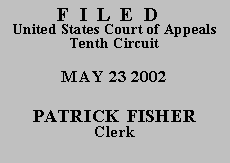

| WILLIE MAYS BAILEY, |
|
| v. | |
| UNITED STATES DISTRICT COURT
FOR THE WESTERN DISTRICT OF
OKLAHOMA,
Defendant - Appellee.
|
Proceeding pro se, the plaintiff Willie Mays Bailey filed this action against the United States District Court for the Western District of Oklahoma ("the Western District"). In his complaint, Mr. Bailey challenged the Western District's disposition of a prior case. According to Mr. Bailey, the Western District "never recognized [him] as the attorney on the case. They never called [him] in on the case while they were working on a transferral. When [the] Western District] did make a decision [,he] was not present to make argument. [The Western District] never filed a default against [the defendant in the prior case]." Rec. vol. I, doc. 1, at 1 (Complaint, filed Mar. 3, 1999).
The district court dismissed Mr. Bailey's complaint without prejudice. The court reasoned that Mr. Bailey had not served the Western District in accordance with Fed. R. Civ. P. 4(i). The court also noted that, in light of Mr. Bailey's history of repetitive filings and abuse of the judicial process, the court had imposed conditions upon Mr. Bailey regarding the filing of any future pro se actions. Rec. vol. I, doc. 20 (Order, filed Aug. 26, 1999).
Mr. Bailey now seeks to proceed in forma pauperis on appeal. In order to do so, he must demonstrate a financial inability to pay the required fees and must advance "a reasoned, nonfrivolous argument on the law and facts in support of the issues raised." McIntosh v. United States Parole Comm'n, 115 F.3d 809, 812-13 (10th Cir. 1997). Upon review of the record and the applicable law, and having liberally construed Mr. Bailey's filings, see Haines v. Kerner, 404 U.S. 519, 520-21 (1972), we conclude that Mr. Bailey has failed to advance a reasoned, nonfrivolous argument to challenge the district court's dismissed Mr. Bailey's complaint without prejudice.
Rule 4(i) of the Federal Rules of Civil Procedure provides:
Serving the United States, Its Agencies, Corporations, Officers, or Employees.
(1) Service upon the United States shall be effected
(A) by delivering a copy of the summons and of the complaint to the United States attorney for the district in which the action is brought or to an assistant United States attorney or clerical employee designated by the United States attorney in a writing filed with the clerk of the court or by sending a copy of the summons and of the complaint by registered or certified mail addressed to the civil process clerk at the office of the United States attorney and
(B) by also sending a copy of the summons and of the complaint by registered or certified mail to the Attorney General of the United States at Washington, District of Columbia, and
(C) in any action attacking the validity of an order of an officer or agency of the United States not made a party, by also sending a copy of the summons and of the complaint by registered or certified mail to the officer or agency.
(2)(A) Service on an agency or corporation of the United States, or an officer or employee of the United States sued only in an official capacity, is effected by serving the United States in the manner prescribed by Rule 4(i)(1) and by also sending a copy of the summons and complaint by registered or certified mail to the officer, employee, agency, or corporation.
Because the Western District is an agency of the United States, Mr. Bailey was required to comply with Rule 4(i) in order to obtain proper service. See Blaney v. West, 209 F.3d 1027, 1029 (7th Cir. 2000) (noting, in an action against a federal officer that "Rule 4(i) required the plaintiff to serve the United States Attorney in the district in which the case was filed, and also required the plaintiff to serve the Attorney General of the United States"). There is no indication in the record that Mr. Bailey complied with these requirements. There is also no indication that Mr. Bailey complied with the requirements that the district court imposed upon him regarding pro se actions.
Accordingly, we DENY Mr. Bailey's motion to proceed in forma pauperis, and we DISMISS this appeal. See 28 U.S.C. § 1915(e)(2)(B)(i) (requiring the court to dismiss a frivolous appeal).
Entered for the Court,
Robert H. Henry
Circuit Judge
*. This order and judgment is not binding precedent, except under the doctrines of res judicata, collateral estoppel, and law of the case. The court generally disfavors the citation of orders and judgments; nevertheless, an order and judgment may be cited under the terms and conditions of 10th Cir. R. 36.3.